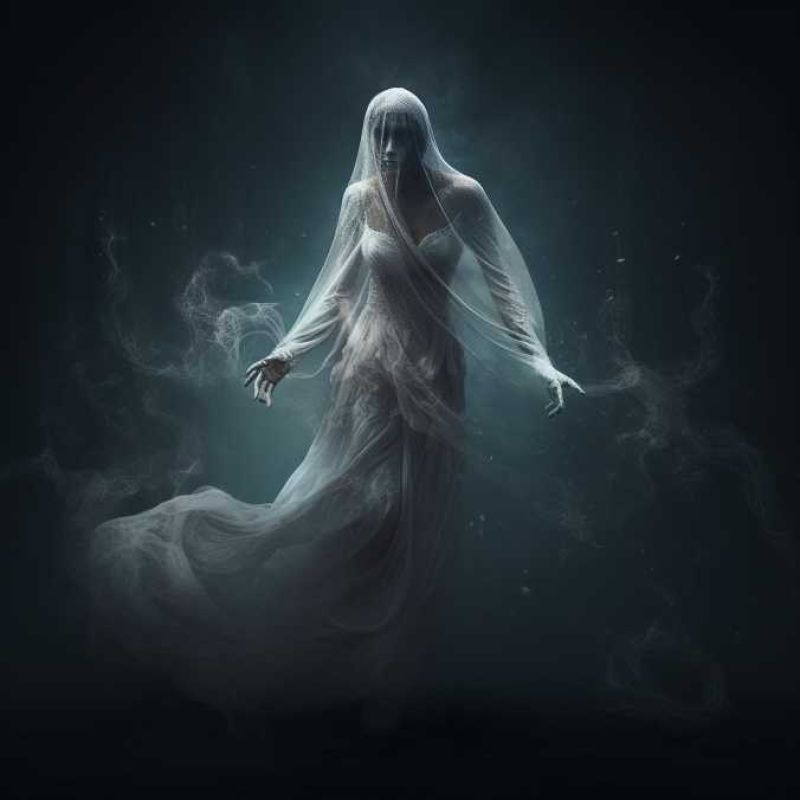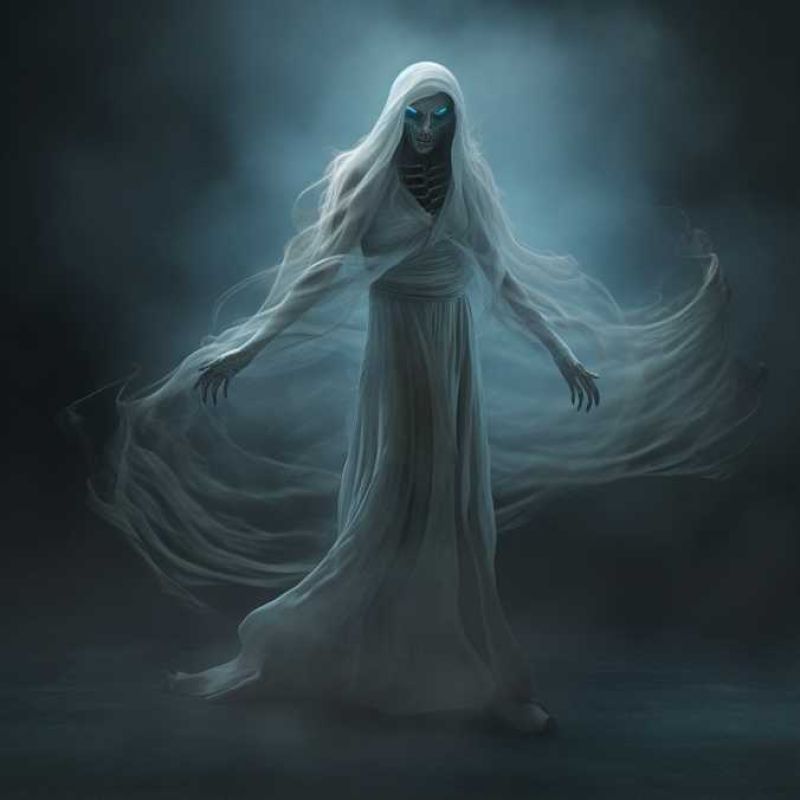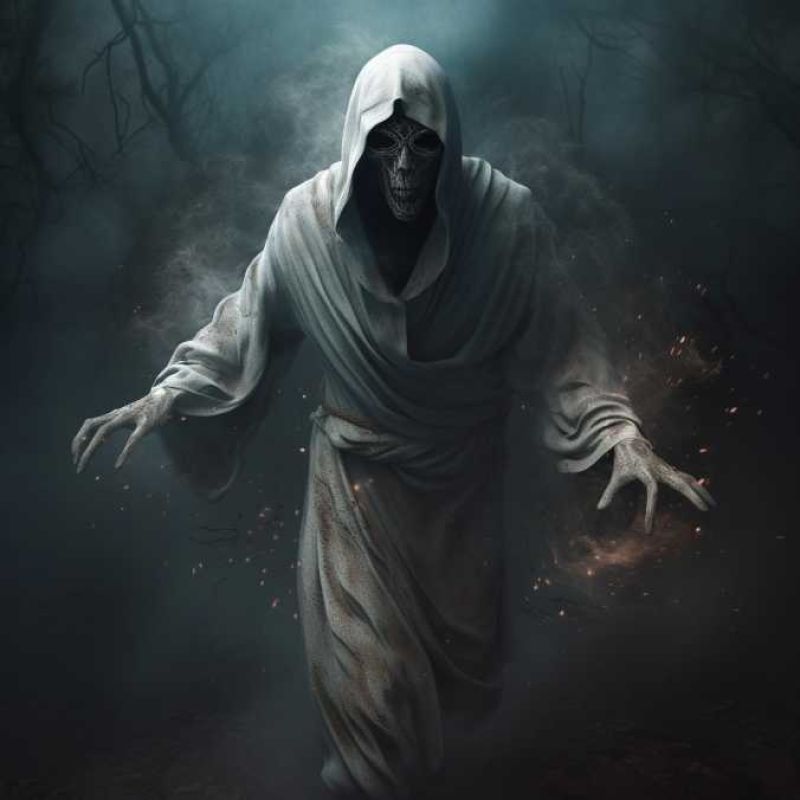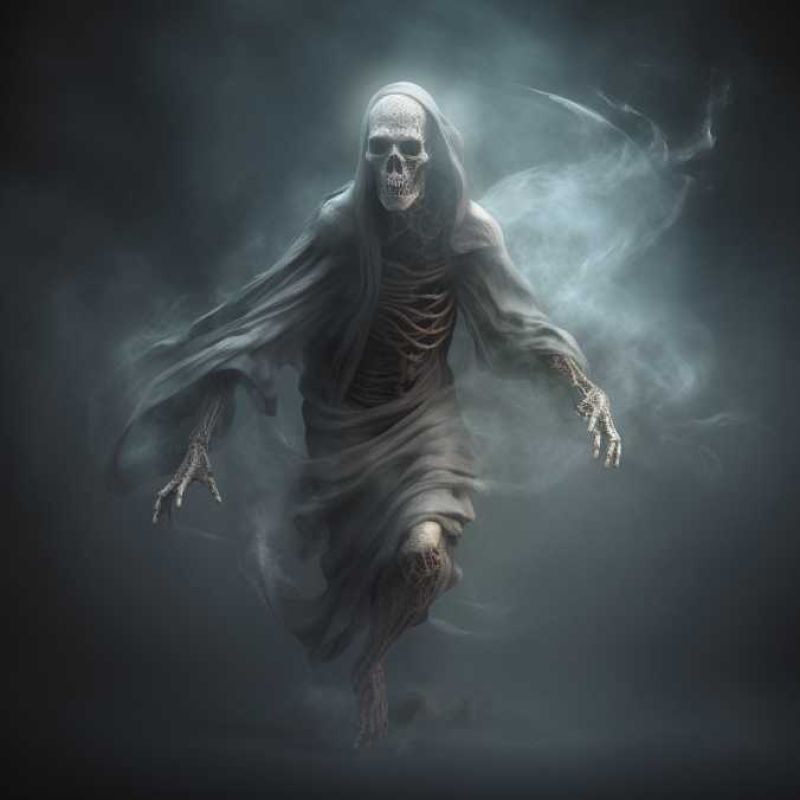 Natural Weapon(s):
Natural Weapon(s):-
Necrotic Touch (4d6)
 Abilities:
Abilities:-
Possession
A soft whisper caresses your ears as the temperature plunges, sending a shiver down your spine. Your senses heighten. In the periphery, a human-sized figure blurs into the background, teasing your perception. Doubt fills your mind. Just as you dismiss it, a spectral presence materializes behind you, confirming the unseen entity that now lingers at your back.
👻🌫️ Ghosts: Echoes of Unfinished Lives
Ghosts are the restless souls of the departed, tethered to the mortal realm by ties too strong to sever in death. 🖤 Bound to a place, person, or object that held deep meaning in life, these spectral entities haunt the world with an ethereal presence, their translucent forms shimmering with unresolved longing. Driven by unfulfilled desires or unrelenting malice, they linger as both tragedy and threat, their whispers a chilling reminder of mortality’s fragility. In any campaign, ghosts are poignant adversaries or mournful allies, their stories weaving threads of mystery and sorrow into the fabric of the narrative.
🕳️ Unfinished Business: Souls Bound by Purpose
A ghost’s existence is defined by an unresolved task, a burning need that anchors it to the living world. 🗝️ Some seek justice, haunting their killers until vengeance is wrought; others cling to oaths, guarding a vow with spectral tenacity. A ghost might wander in denial, repeating the routines of life—polishing unseen armor or tending a vanished garden—unaware of its own demise. Darker spirits are fueled by spite, tormenting the descendants of old enemies or cursing those who cross their path until their malevolence is sated.
The surest way to banish a ghost is to fulfill its purpose, whether by delivering a lost message to a loved one, avenging a betrayal, or laying its regrets to rest. Yet, ghosts can also be undone by invoking relics of their past—a locket that stirs faded love, a weapon that dealt their fatal blow, or a scent, like a gardener’s beloved roses, that weakens their spectral form. Game Masters can craft these anchors to suit their world, tying a ghost’s business to local lore or personal player arcs for emotional resonance.
🌌 Ghostly Manifestations: Harbingers of the Ethereal
A ghost’s presence warps the world around it, casting an aura of profound melancholy and unease. 🥶 Cold spots linger despite roaring fires, and an oppressive silence smothers sound, broken only by eerie whispers or the creak of unseen footsteps. Objects shift without cause—a quill scratching on its own, a door slamming shut—or a choking miasma seeps into the air, heavy with the scent of decay. Corpses may stir, their eyes glowing with borrowed light, or shadows dance where no light falls. These manifestations are involuntary, ripples of the ghost’s anguish that it cannot control, turning haunted places into theaters of dread.
GMs can tailor these signs to reflect the ghost’s story—a warrior’s haunt might echo with clashing steel, a betrayed lover’s with the scent of wilted flowers. These phenomena set the stage for chilling encounters, building tension as players unravel the ghost’s purpose or face its wrath.
⚔️ Spectral Wrath: Fragile Yet Formidable
In confrontation, a ghost is a paradox—fragile yet terrifying, its translucent form flickering with raw emotion. 🩸 It wields ethereal powers, passing through walls to strike from unexpected angles, chilling foes with a touch that saps life, or possessing the living to enact its will. Some ghosts hurl objects with telekinetic fury, while others weave illusions of their past, trapping victims in visions of betrayal or loss. Their strength lies in their intangibility, dodging physical blows while sowing fear with their mournful wails or accusing gazes.
Yet, ghosts are vulnerable to their past. A holy symbol tied to their faith might repel them, or an object of personal significance—like a torturer’s blade for a victim—can unravel their form. GMs can design unique weaknesses, such as a ghost that fades in moonlight or shatters when confronted with its own reflection, making each encounter a puzzle as much as a battle.
🌑 Echoes of a Lost Life
Ghosts are more than specters; they are stories given form, each one a fragment of a life left incomplete. 😔 In a campaign, they serve as poignant mysteries, their haunts revealing forgotten tragedies or hidden truths. A ghost might guard a cursed relic, seek redemption through a hero’s aid, or lash out in blind rage, forcing players to choose between compassion and destruction. Their origins can tie to any setting—a fallen knight in a war-torn keep, a child in a plague-ravaged village, or a betrayed mage in a ruined tower—offering GMs endless ways to weave them into the narrative.
In worlds like Zin, where ancient wounds fester, ghosts might haunt the crypts of lost empires, their laments echoing through shadow-draped valleys. To face a ghost is to confront the past, a challenge that tests heart as much as blade. Heroes who resolve a ghost’s pain may free a soul to rest, but those who falter risk joining the ranks of the restless, forever bound to a world they cannot leave. 👁️🗨️
👻💨 Apparitions: Spectral Heralds of Decay and Despair
Apparitions are vengeful spirits, tethered to the mortal realm by unresolved grievances and seething resentment. 🌫️ These spectral entities drift through the world, their translucent forms radiating an aura of rot and ruin that withers life and beckons the undead. Driven by unfinished business and fueled by rage, they are both a haunting tragedy and a deadly menace, their presence chilling the soul as surely as it blights the land. In any campaign, apparitions are poignant and perilous, their lingering emotions and decaying influence weaving tales of sorrow, vengeance, and redemption.
🕳️ Ethereal Form: Twisted Echoes of Life
Apparitions manifest as ghostly figures, their translucent bodies shimmering with an eerie, sickly glow. 🖤 Often, they resemble their living selves, but their forms are warped by resentment—eyes burning with malice, features contorted in anguish, or limbs trailing into wisps of shadow. A knight’s apparition might clutch a spectral blade, while a betrayed lover’s form drips with illusory tears. Their ethereal nature allows them to glide through walls and hover above the ground, untouchable by mundane weapons yet vulnerable to holy light or radiant magic that sears their corrupted essence.
Game Masters can tailor an apparition’s appearance to reflect its story—a merchant with coins spilling from spectral wounds, or a child clutching a broken toy. Their visual distinctiveness sets the tone for encounters, hinting at the emotions and events that bind them.
🌿 Signs of Decay: Blight of the Spectral Wake
Wherever an apparition lingers, the world sickens. 🌑 Plants wither to brittle husks, wood warps and rots, and the air turns cold and heavy with a stagnant, graveyard chill. This tangible aura of decay is unmistakable, marking their haunts with blackened earth or crumbling stone. The presence of an apparition draws undead—shambling zombies or wailing spirits—amplifying the danger of their domain, while living creatures suffer, their vitality sapped by the oppressive miasma.
GMs can use these signs to build dread, with players noticing wilting crops or rancid water as clues to an apparition’s influence. The decay can escalate with the apparition’s rage, turning a haunted manor into a rotting labyrinth or a village into a necrotic wasteland, creating dynamic environments for exploration or combat.
🗝️ Unfinished Business: Anchors of the Soul
Apparitions are bound by unresolved tasks from their lives, their spectral existence a desperate bid to complete what death denied them. ⚖️ A warrior might seek vengeance for a betrayal, haunting their killer’s lineage; a guardian might protect a lost treasure, unable to rest until it’s safe; a parent might linger to fulfill a broken promise to a child. These goals drive their actions, and resolving them—through aid, trickery, or force—can lay an apparition to rest, freeing its soul from torment.
Understanding an apparition’s purpose is key to confronting it. Some can be reasoned with, their rage soothed by fulfilling their desires, while others are too consumed by hatred to negotiate. GMs can craft unique tasks tied to the campaign’s lore—a forgotten oath to a fallen god, or a love letter never delivered—making each apparition a narrative puzzle that rewards empathy or cunning.
⚔️ Resentment and Rage: Fury of the Forsaken
An apparition’s heart burns with intense emotions—grief, betrayal, or unquenched wrath—that fuel its spectral might. 😡 In combat, they unleash this rage, hurling necrotic blasts, draining life with a chilling touch, or summoning decayed remnants of their past to fight. Their ethereal forms shrug off physical blows and necrotic forces, but holy relics, radiant spells, or artifacts tied to their life—like a betrayer’s dagger or a lover’s locket—can pierce their defenses, unraveling their essence.
Their emotions also shape their behavior. A sorrowful apparition might plead for aid, while a vengeful one hunts relentlessly. Players who discern these feelings—through investigation or magic—can turn the tide, calming the spirit with empathy or provoking it to reckless fury. GMs can use this emotional core to create dynamic encounters, where combat blends with roleplay, and understanding the apparition’s pain becomes as crucial as striking it down.
🌌 Shadows of a Shattered Past
Apparitions are more than spectral foes; they are echoes of lives left incomplete, their decay a mirror to their inner torment. 🖌️ In a campaign, they serve as haunting mysteries, their haunts revealing forgotten sins or buried truths. Players might aid an apparition to free a cursed village, battle one to claim its guarded relic, or uncover its story to prevent a greater evil. Their origins can anchor to any setting—a scorned priest in a desecrated temple, a sailor lost to a storm-haunted reef, or a rebel executed in a tyrant’s dungeon—offering GMs endless ways to enrich their world.
In realms like Zin, where ancient grudges linger, apparitions might drift through war-scarred ruins, their rot seeping into the land’s wounds. To face an apparition is to grapple with the past’s weight, a challenge that tests compassion as much as courage. Heroes who resolve an apparition’s pain may bring peace to a haunted place, but those who falter risk falling to the decay that follows in its wake, forever marked by the specter’s wrath. 👁️🗨️
 Special Senses:
Special Senses:-
 Nightsight: +60
Nightsight: +60
-
 Ghostsight: +60
Ghostsight: +60
 Damage Type Immunity:
Damage Type Immunity:-
 Cold
Cold -
 Necrotic
Necrotic
 Damage Type Vulnerability:
Damage Type Vulnerability:-
 Radiant
Radiant
 Immune to Status Effect:
Immune to Status Effect:-
 Bleeding (2d6)
Bleeding (2d6) -
 Charmed
Charmed -
 Chilled
Chilled -
 Freezing
Freezing -
 Frightened
Frightened -
 Frozen
Frozen -
 Grappled
Grappled -
 Grappling
Grappling -
 Immobile
Immobile -
 Paralyzed
Paralyzed -
 Petrified
Petrified -
 Prone
Prone -
 Restrained
Restrained -
 Sleeping
Sleeping -
 Starving
Starving -
 Suffocating
Suffocating
 Persistant/Permanent Status Effect:
Persistant/Permanent Status Effect:-
 Incorporeal
Incorporeal
-
 Damage Mitigation:
+2
Damage Mitigation:
+2



